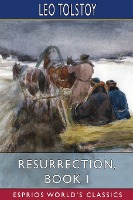Resurrection (pre-reform Russian: ¿¿¿¿¿¿¿¿¿¿¿; post-reform Russian: ¿¿¿¿¿¿¿¿¿¿¿, tr. Voskreséniye, also translated as The Awakening), first published in 1899, was the last novel written by Leo Tolstoy. The book is the last of his major long fiction works published in his lifetime. Tolstoy intended the novel as a panoramic view of Russia at the end of the 19th century from the highest to the lowest levels of society and an exposition of the injustice of man-made laws and the hypocrisy of the institutionalized church. The novel also explores the economic philosophy of Georgism, of which Tolstoy had become a very strong advocate towards the end of his life, and explains the theory in detail. The publication of Resurrection led to Tolstoy's excommunication by the Holy Synod from the Russian Orthodox Church in 1901.


